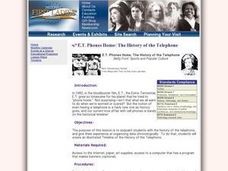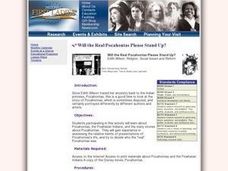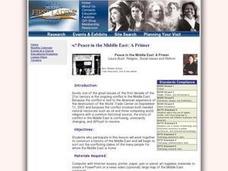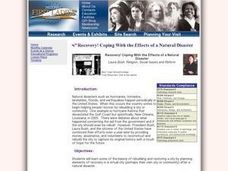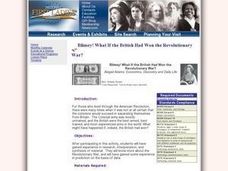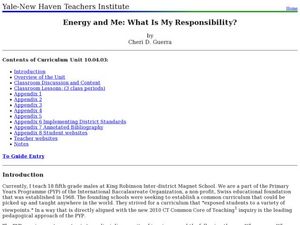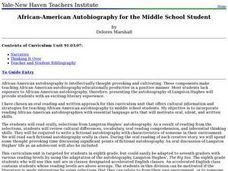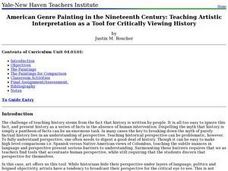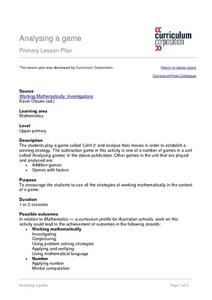National First Ladies' Library
Ragtime: The First "American" Music?
Learners investigate the concept of ragtime music and the times associated with it in American history. They conduct research using a variety of resources and listen to a sample before writing down some of the results of the information...
National First Ladies' Library
Let's Make a World Series Almanac
Middle schoolers discuss the meaning of the word, almanac and then decide which statistics about the World Series they think should be included in the almanac, browsing some websites to get some idea of what statistics are available....
National First Ladies' Library
Designing an Appalachian Folk Art Museum
Learners investigate the concepts related to the Appalachian area and the movement of Folk Art. They conduct research using a variety of resources and use the samples as inspiration for creating their own works of art. They could...
National First Ladies' Library
Gibson Girls and Flappers: What is this "New Woman"?
Students divide into five groups with each exploring one section of the website, "The New Woman". After they complete their research, they discuss the nature and characteristics of the "new woman" and compare these to characteristics of...
National First Ladies' Library
Social Studies: Who Burned Down Barnum's Museum?
Learners examine the social conflict of the 19th century and the destruction of the American Museum. In pairs, they conduct Internet research and attempt to solve the mystery of who burned down the museum. Clues to the mystery are found...
National First Ladies' Library
E.T. Phones Home: The History of the Telephone
Students create illustrated timelines of the telephone's history. In groups, they research 25-year sections beginning in 1876. Once each group has completed their portion of the timeline, they are all assembled to create one banner.
National First Ladies' Library
Michigan vs. Ohio State: A Serious Rivalry!
Middle schoolers discuss and research the pros and cons of school rivalries. In particular, they study the Michigan-Ohio State rivalry. Through their research, they think about how media accounts of college football games can be shaped...
National First Ladies' Library
Who’s on First? in the End Zone? at the net? in the Ring?
Pupils are introduced to some sport heroes from the 20th century. They are told that although many sports have their own Halls of Fame, there is no one list of the top 10 athletes from the 20th century. It is their job to research famous...
National First Ladies' Library
Slavery in the Beginning: Creating a Virtual Museum
Social studies learners explore slavery in the American colonies from 1607 to the Revolutionary War. In groups, they explore a PBS website and a virtual museum. Using these websites and other online resources, learners create their own...
National First Ladies' Library
'Tis a Gift to Be Simple: The Shaker People
Students identify the difficulties and benefits of a utopian community. They examine their own ideas of utopia and research an example of one such community that has had an impact on our own culture.
National First Ladies' Library
Riding the Underground Railroad
Young historians explore the underground railroad and life as a slave during the Civil War. After internet research, they discuss the hazards of travel as a slave and the benefits of freedom. Individually, learners write a short story...
National First Ladies' Library
Who Invented Crayons?
Pupils use a specified website to study the history of Crayola crayons. In groups, they discover who invented the colors, their cost, and who thought of the name. Learners create a timeline of Crayola colors and choose one project from...
National First Ladies' Library
Will the Real Pocahontas Please Stand Up?
Learners explore the life of Pocahontas and Powhatan Indians. After studying information on a given website, students compare and contrast what they read about Pocahontas and what they previously thought of her. They explore life in a...
National First Ladies' Library
Peace in the Middle East: A Primer
Middle schoolers are introduced to the concept of three Abrahamic religions and complete the Comparative Religion Exercise. They view slides after taking their best guesses and read the article, "The Path to Peace Runs Through a History...
National First Ladies' Library
Recovery! Coping with the Effects of a Natural Disaster
Students explore natural disasters and the devastation caused by them. Using specified websites, learners examine how people rebuild after a disaster. In groups, they design and rebuild a community and conclude by writing an essay...
National First Ladies' Library
Building a Federal Town: Washington, DC
Young scholars create a timeline of the history of Washington, D.C. from 1787 to 1879. Using the internet, they read specified articles about the design of the capital and city of Washington DC. Young scholars write a newspaper article...
Curated OER
Energy and Me: What is My Responsibility?
Students investigate energy and their impact on the environment. In this environmental lesson plan, students will conduct a series of three activities that will help in their understanding of energy and how we use it.
Curated OER
African-American Autobiography for the Middle School Student
Students are introduced to the characteristics of an autobiography. For each author, they research their life and works and discuss why it reflects different time periods of African-Americans. In groups, they brainstorm characteristics...
Curated OER
American Genre Painting in the Nineteenth Century: Teaching Artistic Interpretation as a Tool for Critically Viewing History
Students view a variety of artwork to determine the history and lifestyle of people from New Haven, Connecticut. In groups, they develop their individual hypothesis about why the paintings were created and share them with their group...
Curated OER
Analysing a game
Students play a game called 'Limit 2' and analyse their moves in order to establish a winning strategy. The subtraction game in this activity is one of a number of games in a unit called 'Analysing games' in the above publication.
Curated OER
Artifacts: Bringing the Past Back to Life -- the Mexican Case
Students examine and discuss the meanings of the various symbols in Tenochtitlan. In groups, they complete a part of the model of the city and discuss the importance of finding artifacts. Individually, they choose an a two-dimensional...
Curated OER
New Movements For Social Justice: The Latino Struggle for Equal Rights
Students examine myths and stereotypes about Hispanic immigrant groups. They appreciate and share the strengths of their diversity and view films that challenge ideas about education and cultural values. They explore the Latino Rights...
Curated OER
Mathematics and Ecology: Through the Window Garden
Student discover some of the ideas and concepts that make up the topic of Ecology. They read and interpret graphs to assimilate the information that is displayed. They discover the rate of increase of Carbon dioxide in the atmosphere...
Curated OER
Sherlock Holmes: Teaching English Through Detective Fiction
Learners read examples of mysteries and detective fiction. With a focus on Sherlock Holmes, they are introduced to the techniques for reading properly. In groups, they define new vocabulary, make predictions and summarize the stories. ...







